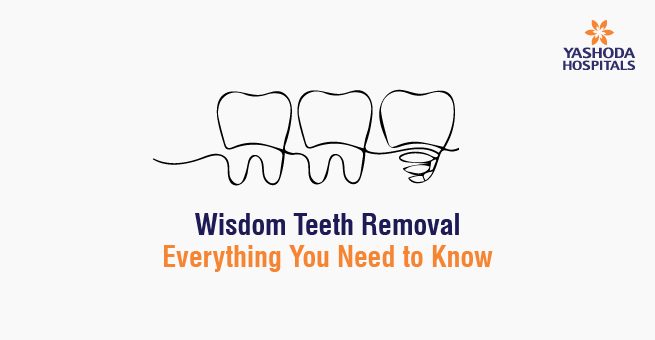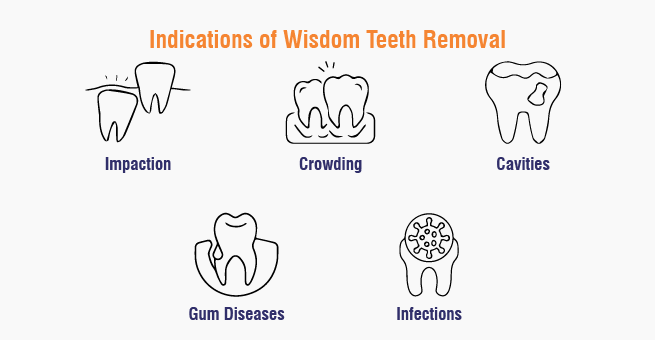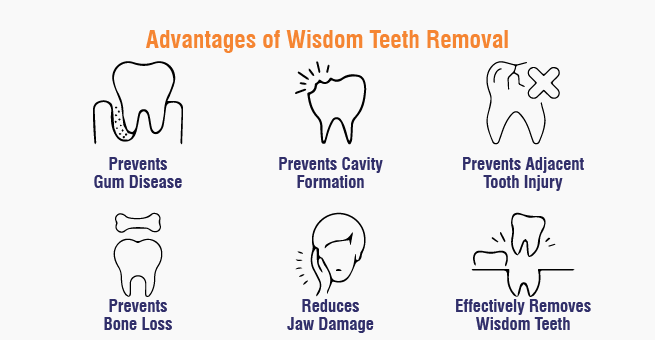Wisdom Teeth Removal: Everything You Need to Know

Wisdom teeth, or third molars, are the last set of teeth to erupt in the back of the mouth, typically emerging between ages 17 and 25. If they are impacted, crooked, or causing pain, a dentist may recommend wisdom teeth removal. This common dental procedure can prevent future complications and improve oral health. This blog includes information about when to get wisdom teeth removed, what to expect during the procedure, recovery tips, and more.
What are Wisdom Teeth?
Wisdom teeth refer to the last set of permanent adult teeth, which consists of four in total, with two at the top and two at the bottom of the back corners of the jaws. About fifty percent of all human beings develop at least one spare tooth, yet some individuals do not develop any. Unlike all permanent teeth, wisdom teeth emerge between the ages of 17 and 25 years. Symptoms associated with the presentation of wisdom teeth include pains in the jawbone and the face at large, reddening or inflation of the gums, and the appearance of whitish patches behind the last set of molars.
What are the Indications of Wisdom Teeth Removal?

Wisdom teeth can promote a set of complications that over time become worse, including pain, infection, and damage to surrounding teeth. The dentist may recommend the removal of the wisdom teeth to prevent such complications. The most common indications that result in a recommendation to have wisdom teeth removal surgery include trapped (impacted), overcrowded, or decayed wisdom teeth.
- Impacted wisdom teeth
Wisdom teeth can be completely blocked from coming in normally. They might get stuck in the jawbone or the gums and may be quite painful.
- Wisdom teeth crowding
Sometimes, the mouth is not large enough to accommodate more teeth. The jaw does not have room in it for that extra set of molars. For these reasons, wisdom teeth may push against other teeth and emerge at odd angles. This could chip the adjoining teeth and cause them to become crooked.
- Cavities and gum disease
Part of the wisdom teeth are not accessible to be cleaned by the toothbrush or dental floss. So, one is more likely to trap food around them. Trapped food, which eventually forms plaque, causes gum disease as well as tooth decay, which is commonly called cavities. Because of where the tooth is located, a dentist may not be able to treat a cavity in the wisdom tooth. Thus, removal of the tooth is the best alternative that will avoid further damage of the other teeth and gums and may lead to severe infections of the mouth and gum.
Noticing the above-mentioned signs?
Wisdom Teeth Removal Procedure
Preparation: An oral surgeon evaluates the condition of wisdom teeth and determines their position using x-ray imaging. They explain the sedation dentistry approaches, which can be local, nitrous oxide, intravenous, or all-out anesthesia. When IV sedation or general anesthesia is preferred, the surgeon explains in detail how to get ready for the surgery, including fasting and stopping medications. It is also obligatory to warn the surgeon of any medications, supplements, or vitamins that are being taken at that time.
During the procedure: The doctor will give anesthesia around the teeth and the gums, cut the gum tissues to uncover buried teeth, dislodge the tooth, clear the site for clean-out debulking at the infection-reducing stage, apply sutures to approximate the wound edges, and place gauzes on the cavities to control bleeding. Usually, the entire process lasts not more than an hour, and on the other hand, complicated conditions take a longer duration. If necessary, relaxing medication will be offered.
After the procedure: It is normal to anticipate some reasonable level of pain, slight blood loss, and swelling after one has had their wisdom tooth extracted. Wisdom tooth removal aftercare instructions are provided by the oral surgeon in an effort to minimize these discomforts. When the sedation wears off enough, one will be suggested to leave the hospital.
What are the Advantages of Wisdom Teeth Removal?
Removing wisdom teeth can lower your chances for dental health conditions in the future, such as:
- Reducing future gum disease risks.
- Preventing cavity formation.
- Preventing adjacent tooth injury.
- Preventing bone loss.
- Reducing jaw damage.
- Effectively removing wisdom teeth causes pain.

Concerned about your dental health?
Wisdom Teeth Removal Side Effects
Though wisdom teeth removal surgery is standard, it can result in side effects. These side effects tend to range from mild, moderate, to severe depending on individual differences and the degree of difficulty of the procedure. Below are some of the common side effects of removing wisdom teeth:
Less severe side effects
- Pain and discomfort: This is expected after any surgical procedure. Over-the-counter pain relievers can help manage this for most people.
- Swelling: Kin swelling is likely to occur, owing to the healing process in the first 3 days, especially after surgery.
- Bleeding: Some bleeding is normal, especially in the first 24 hours. Placing gauze pads over the surgery area and biting down for a few hours usually helps with this.
- Trismus: This is the inability to open the mouth; this is most likely to be temporary and improve as the swelling goes down.
- Metallic taste: An unusual flavor in the mouth can present itself as a metallic or unpleasant tinge.
Potential Longer-Lasting Effects
- Alveolar osteitis: This is the most painful complication when there is dislodgement of the blood clot covering the alveolar bone and exposing it. Therefore, reinsertion of blood clots is the only treatment available.
- Infection: Although rarer, the extraction sites are open wounds, and infection is possible if bacteria invade an extraction site. Fever, swelling, pus, and again swollen…anything?
- Nerve trauma: sometimes it happens when the lower wisdom teeth are removed that the teeth that are very close to the nerves can get accidentally. This leads to some tingling or numbness in the tongue, lip, or jaw areas.
Wisdom Teeth Removal Recovery Time & Pain Management
The standard period for returning to normal dispositions after wisdom teeth extraction is one to two weeks. However, many people tend to return to activities in approximately three to five days. The surgeon will explain the care one needs to manage their comfort level during the postoperative phase in detail. Anesthesia affects everyone differently, and the recovery experiences vary for each person. The recovery period immediately after surgery correlates with the kind of anesthetic agent one had during the operation.
Wisdom teeth removal pain
After the extraction of wisdom teeth, one can expect mild to moderate discomfort to persist for 3-4 days. Using an ice pack or a box of frozen peas on the cheek may greatly relieve the discomfort and inflammation. Pain and discomfort can be relieved with pain relievers. In case the doctor had to remove a portion of bone during the procedure, a stronger painkiller medication may be prescribed.
Wisdom Teeth Removal Cost
The cost of wisdom teeth removal varies significantly based on factors such as location, dentist’s experience, procedure complexity, anesthesia type, and additional services. Insurance coverage may cover a portion or all of the cost, so check with the insurance provider. Many dentists offer flexible payment plans. Lastly, it’s crucial to choose a dentist who is experienced and qualified to perform the procedure. It’s best to discuss the cost of wisdom teeth removal with the dentist during the consultation to get a detailed estimate.
The cost of wisdom teeth removal at Yashoda Hospitals in Hyderabad varies based on the above discussed and additional services required. Contact Yashoda Hospital or consult a dentist from Yashoda for an accurate estimate.
Ready to find out more about the cost of wisdom teeth removal?
Postoperative Instructions for Wisdom Teeth Removal
The surgeon will give postoperative guidelines and modifications specific to the situation. Following these instructions will help one to manage bleeding, swelling, and pain after the procedure:
- Leave gauze in place for 30 minutes post-surgery. Replace with clean gauze if necessary.
- Rest at home for at least three to five days.
- Use an ice pack to reduce swelling.
- Keep extraction sites clean with alcohol-free antibacterial mouthwash.
- Brush and floss the rest of your teeth daily.
- Take all prescribed medications as prescribed.
- Don’t drink through a straw to dislodge blood clots.
- Don’t exercise until the surgeon approves.
- Don’t do heavy things to increase the risk of postoperative complications.
- Don’t eat hard, crunchy, or chewy foods to damage healing gums.
- Avoid carbonated or alcohol-containing beverages for at least five days.
When to Seek Help from a Dentist
Seek an immediate medical appointment from the dentist if you have experienced the following signs and symptoms:
• Problems with swallowing.
• Internally traumatic bleeding.
• A rise in temperature.
• Pain that is so severe that pain relief medications fail to provide even a little relief.
• Unremovable bad taste in mouth.
• Slow leakage of pus or fluid from the socket.
• Lending numbness or loss of sensation.
Conclusion
Wisdom teeth removal is a common dental procedure that can help prevent future complications such as pain, infection, and crowding of other teeth. While the procedure may involve some discomfort and potential side effects, the benefits often outweigh the risks. By following your dentist’s instructions and taking proper care of your oral health, you can ensure a successful recovery and enjoy a healthier smile.
Yashoda Hospitals in Hyderabad offer comprehensive wisdom tooth removal treatment, utilizing experienced surgeons and dentists. The state-of-the-art facilities and advanced technology ensure a safe and comfortable experience for patients. The team takes a personalized approach to each patient’s needs, providing tailored treatment plans and a calm, relaxing environment.
References:
- https://www.ncbi.nlm.nih.gov/books/NBK279590/
- https://www.nhsinform.scot/tests-and-treatments/dental-treatments/wisdom-tooth-removal/
- https://www.webmd.com/oral-health/wisdom-teeth-adult
- https://my.clevelandclinic.org/health/treatments/22119-wisdom-teeth-removal#procedure-details
- https://www.mayoclinic.org/tests-procedures/wisdom-tooth-extraction/about/pac-20395268










 Appointment
Appointment WhatsApp
WhatsApp Call
Call More
More

